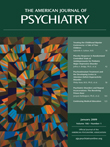Placebo Response in Randomized Controlled Trials of Antidepressants for Pediatric Major Depressive Disorder
Abstract
Objective: The authors examined characteristics and predictors of response to placebo in all available reports of short-term randomized controlled trials of antidepressants for pediatric major depressive disorder. Method: Response, defined as a score ≤2 on the improvement item of the Clinical Global Impression scale, and potential predictors were extracted from 12 published and unpublished randomized controlled trials of second-generation antidepressants in participants 6–18 years of age with major depression. Results: The single best predictor of the proportion of patients taking placebo who responded to treatment was the number of study sites. Baseline severity of illness also emerged as a significant inverse predictor of placebo response, although the strength of this relationship was diminished when number of sites was controlled for. After one large fluoxetine trial was excluded, younger participants showed a higher placebo response rate than older adolescents. Higher placebo response rates in more recent studies were explained by an increasing trend toward large multisite trials and by publication delays and failures to publish some negative trials. Conclusions: The recent shift toward large multisite trials of antidepressant medications for pediatric major depression may be contributing to an increasing incidence of response to placebo. Pharmacotherapy studies of pediatric depression that carefully recruit patients with at least moderately severe depression may be more informative and efficient than many trials conducted to date. Such studies should have sufficient power to determine whether age moderates medication and placebo response.



